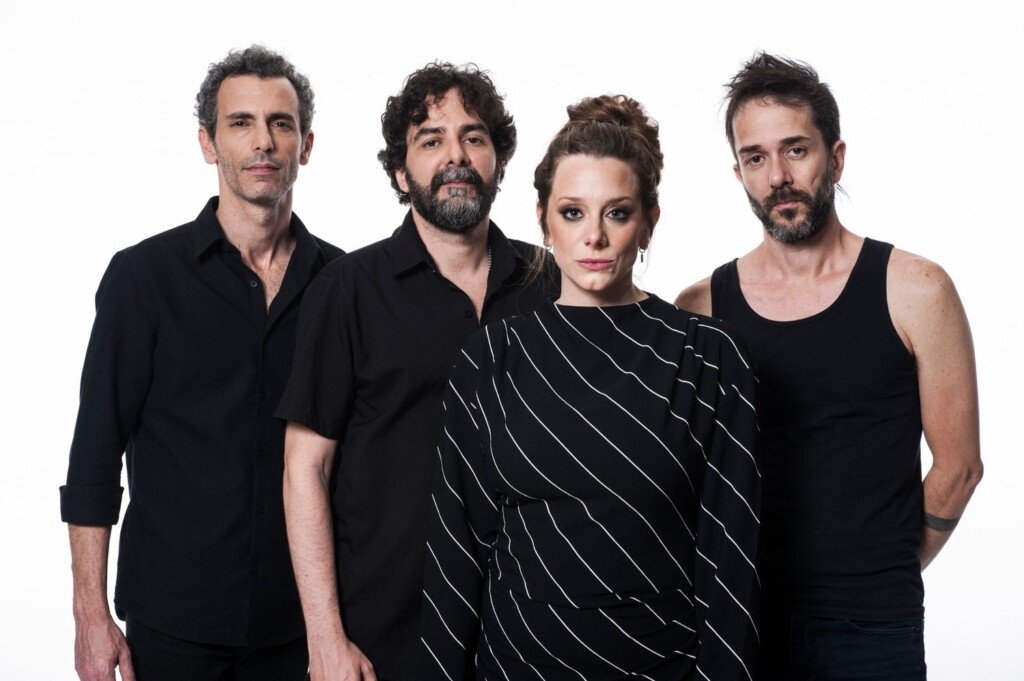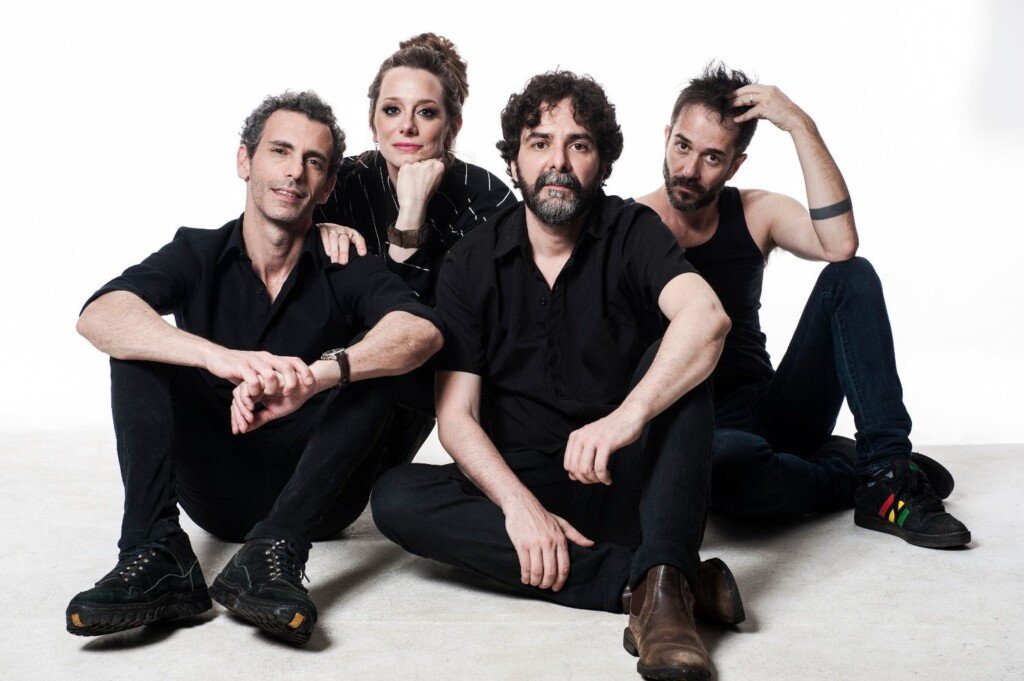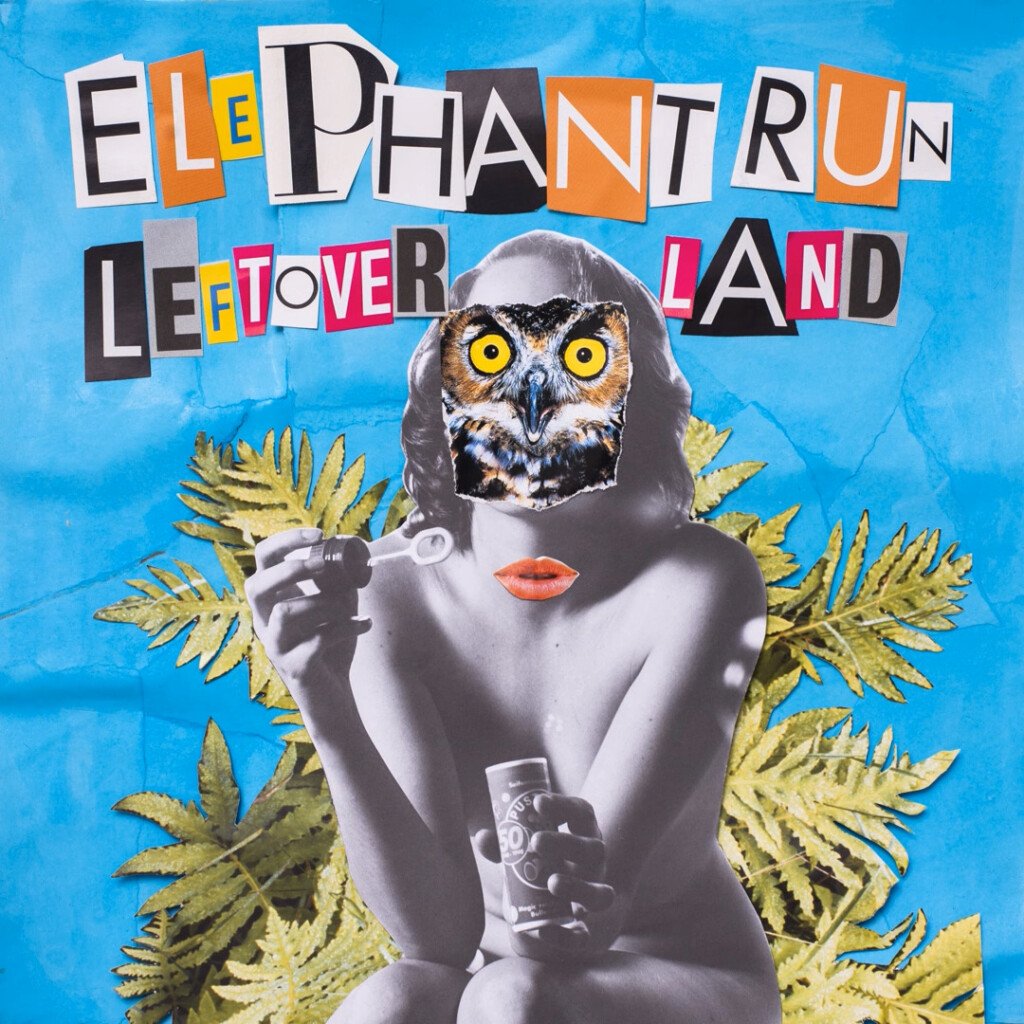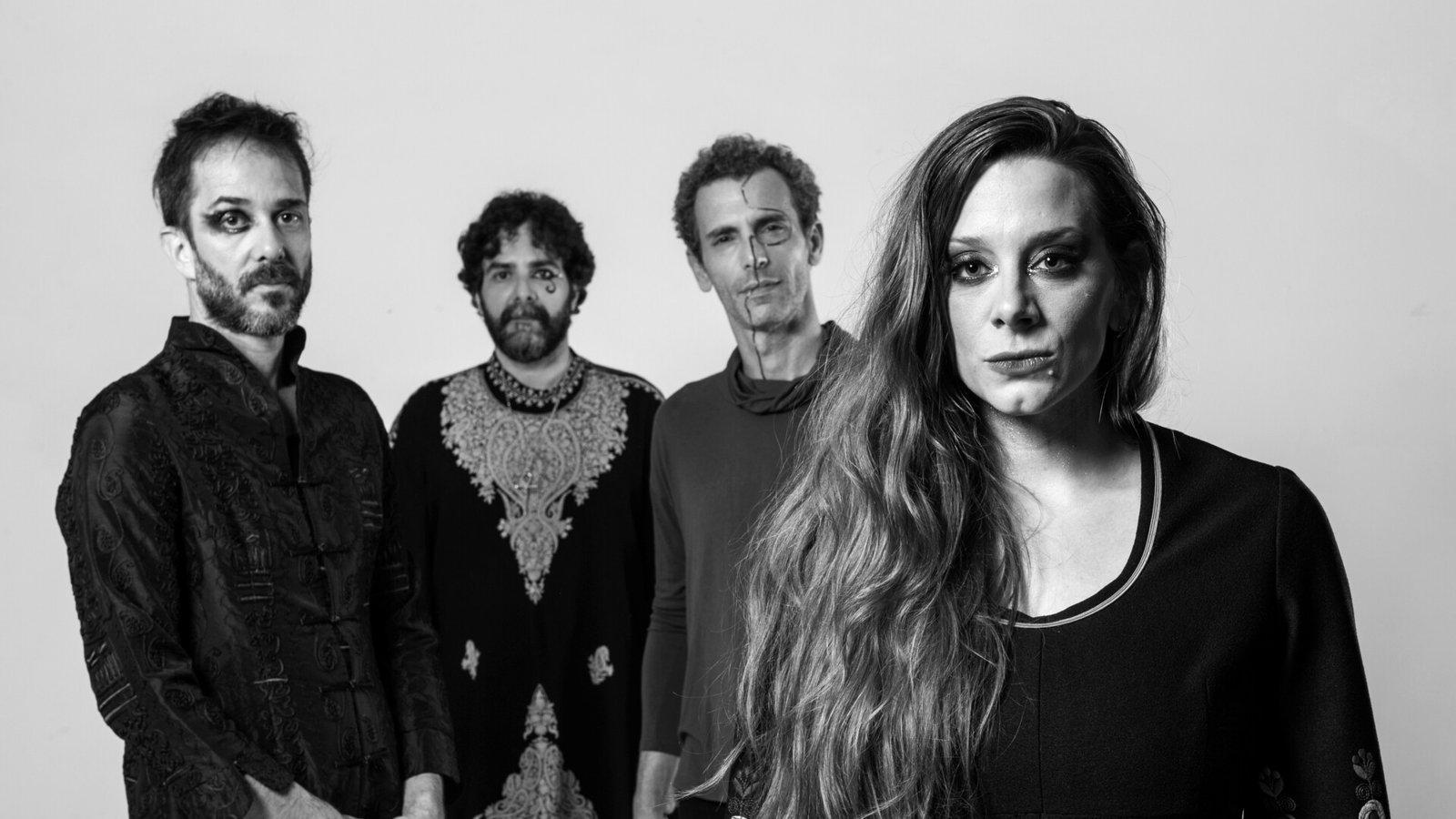Elephant Run is a band built across continents that turns distance into sound. Their music is shaped by the push and pull of two distant cities (Malmö & São Paulo) – a Nordic Tropical storm of quiet tension building into bursts of energy, a sound that feels both unpredictable and inevitable. It’s not about where they are from, but how they meet in the music and where their sound takes you. Check out the exclusive interview below:

1. Your roots can often shape your journey. Can you share a story or moment from your early life that had a significant impact on your path into music?
LADISLAU: When we think about what ‘roots’ mean in this context, for us, it all starts with our parents. The band’s earliest influences came from them, though each of us discovered music in completely different ways.
Coelho’s father, Lauro Machado Coelho, was a respected critic and journalist who specialised in opera and classical music. Amanda’s mother was always playing the piano and listening to Roxy Music, while her father, Peter Wahlström, ran Kulturbolaget—one of Sweden’s most legendary rock venues in the ’80s and ’90s.
Renato’s parents, meanwhile, were deeply rooted in MPB (Brazilian Popular Music). Though his mother owned records by Bowie, Queen, and Led Zeppelin, Brazilian music always took centre stage at home. His father would play the pandeiro (tambourine) at rodas de samba (samba gatherings) during São Paulo’s vibrant nights. And my father, Ladislau F. Kardos, was a drummer in his youth, with a particular passion for Gene Krupa.
From the very beginning, the music our parents played at home—whether on records, the radio, or live—shaped us profoundly. It was our starting point, the foundation from which we each began exploring and carving out our own musical paths.
2. Did your musical journey begin with formal training, or was it more of a personal exploration? How has that shaped your unique approach to your craft?
AMANDA: I grew up playing classical piano and attended a music-focused high school, but I found myself stuck in a rigid classical track that no longer inspired me—I wanted to write my own music and explore different genres. Eventually, I became so frustrated that I quit music altogether.
During my travels and university years, I slowly started recording lo-fi songs on my laptop, just for fun. That’s when I began singing, experimenting, and—most importantly—finding my own voice. Some of those early ideas even turned into Elephant Run songs later on. Rediscovering music on my own terms completely shaped the way I create today.
LADISLAU: I began with the keyboard but stumbled upon my father’s old drum kit in my grandmother’s garage—and never looked back. Coelho realised his passion for music was best expressed through melodies, so he took up the guitar. Renato, meanwhile, began on piano at six but quit formal lessons by ten. From then on, he taught himself, jumping between instruments. He’s always said you really grow as a musician by playing with others—especially those better than you. It forces you to raise your game, to learn how to articulate your ideas and hold your own in a band.
3. Who were some of the most influential figures in your early musical life, and how did they inspire your sound? Also, what’s the story behind choosing the name ‘Elephant Run’?
AMANDA: We actually started out calling ourselves Vaca (‘cow’ in Portuguese), but we quickly realised we needed something better. I think we all remember it slightly differently—haha—but I recall us sitting in Coelho’s kitchen one night when Elephant Run came up. It might’ve been inspired by a song we were working on called Run, Elephant, but we loved the imagery: something massive and majestic, charging forward with unstoppable momentum. Maybe it’s panic, maybe you just run alongside it.
We even debated whether it should be Elephant Run or Elephant, Run—who knows, maybe it’s both!
LADISLAU: We’d all played in different bands before, but they’d all reached their natural end. When we first started playing together, it was just about the music – no name, no expectations, no band responsibilities. Then suddenly, we got offered a gig and needed a name… fast.
Cue the frantic brainstorming session! We came up with endless ideas, but nothing quite fit. Then Amanda showed us this song she’d been working on called ‘Run Elephant’. I flipped it to ‘Elephant Run’ and just said it out loud.
There was this instant click – one of those rare moments where everyone just goes quiet because they know. It made perfect sense for us. After all, you don’t just walk past a herd of elephants and come out unscathed…
4. What do you believe sets your music apart? How would you describe your sound to someone discovering you for the first time, and what emotions or experiences do you hope to evoke in your listeners?
LADISLAU: The cultural contrasts between Brazil and Sweden, combined with our diverse individual influences, create wonderfully unpredictable starting points in our creative process. We don’t consciously chase specific genres, though we understand the need for classification when communicating our sound. That’s why we playfully describe it as ‘Nordic Tropical’ – while leaving space for listeners to interpret it however they wish.
Ultimately, we create the music, and our audience is free to associate it with whatever resonates with them emotionally. Whether it evokes warmth, nostalgia, or something entirely unexpected – that journey belongs to the listener.

5. Music often transcends entertainment. What’s your view on the role and function of music as political, cultural, spiritual, and/or social vehicles – and do you try and affront any of these themes in your work, or are you purely interested in music as an expression of technical artistry, personal narrative, and entertainment?
AMANDA: For me – though the others might see it differently – Elephant Run’s music is inherently narrative, but not necessarily personal or autobiographical. Our songs can be fictional, abstract, or drawn from observation. Even when we’re not writing overtly political material, our lyrics inevitably mirror the systems we inhabit, the struggles we witness, and the questions that haunt us. There’s always some reflection on the state of things woven into the music – sometimes explicitly, sometimes through metaphor or dark humour.
That said, we never want to lose sight of music’s joy and entertainment value. We adore experimenting, playing with sound, and simply having fun with the creative process – and we hope that energy comes through. At its best, we’d like our music to make people feel something, spark their curiosity, and above all, let them enjoy the ride.
LADISLAU: Music and art always reflect the times we live in – that’s an undeniable fact. Whether through albums, books, poetry or any other form, they’ve consistently shaped and reshaped culture and our understanding of ourselves. Sometimes this is intentional, sometimes it’s not.
Following Amanda’s point, our creative process naturally involves what we see, what we feel, and what resonates with us as friends and artists. Our approach is to listen to what the music itself is asking from us, and then collaborate with that impulse…
6. Do you feel the rewards of your musical career match the energy and passion you invest in it, or are there different kinds of fulfillment you’re still seeking?
LADISLAU: We began playing together simply because we love spending time together – hanging out, chatting, listening to music, and most importantly, for the sheer joy of creating. That pure passion for making music remains our fundamental purpose, and it’s something we never want to lose.
Of course, as we’ve evolved into a proper band, our ambitions have naturally grown. We want to perform live, record albums, tour, make a living from our art, and connect with audiences. On the business side, we’re learning to navigate the realities of the music industry while staying true to ourselves. It’s about finding that balance – doing what needs to be done to sustain this dream, without ever losing sight of why we started in the first place.
7. Can you walk us through your creative process? From the first spark of an idea to the finished track, what’s the most essential part of your process, and how do collaboration or external influences shape your work?
AMANDA: Our creative process is quite organic, though it usually begins with someone bringing an idea to the table – sometimes a fully formed sketch, sometimes just a riff or melody. We then play around with it together, experimenting until it starts to take shape. It’s often cyclical: we jam, develop, restructure, sometimes make demo versions, and revisit ideas multiple times.
Melodies tend to emerge early – often before we’ve figured out the lyrics. There’s usually an intuitive sense of phrasing and where the words should sit, even when we don’t yet know what those words will be. The actual lyrics typically come much later in the process.
For our second album, Leftover Land, we revisited and reworked many older ideas, restructuring and polishing them. Once we committed to finishing those tracks, everything came together surprisingly smoothly.
The third album was a different experience altogether. During what should have been the composing phase, we were scattered across different countries.
Coelho and Ladis jammed together and sent me recordings, and while I experimented with melodies from Sweden, nothing really clicked until I flew to Brazil and we sat down together in Coelho’s house. Renato and I also brought some ideas that we then developed as a band – some at Coelho’s place, others in the studio.
The crucial moment always comes when we’re physically together, playing the songs in the same room. That’s when the magic happens – or doesn’t. I might create fully-produced tracks in my own style at home, but with the band, the music always transforms in ways I could never anticipate. That’s what makes Elephant Run special: through collaboration, the songs evolve into something none of us could have created alone.
LADISLAU: For us, the creative process always begins with the simple joy of making music together. Sometimes a track emerges from someone’s initial idea, other times it grows organically from a jam session. Whenever we’re physically together in a room, the magic happens – a riff transforms with new harmonies, a rhythm shift completely reworks a section, and so on.
The playing, experimenting and sheer fun of creation are what make it so rewarding. One of the hardest but most valuable lessons we’ve learned is to listen to each other’s ideas without immediately saying ‘no’ – that openness always pays off in the end.
8. What’s been the most challenging hurdle in either your personal life or music career, and how has it shaped you as an artist?
LADISLAU: Being a band spread across two different countries and multiple Brazilian states is our biggest ongoing challenge. The distance shapes everything – how we keep the dream alive, how we maintain that creative spark, and how we balance our musical ambitions with daily realities. These questions occupy our thoughts constantly.
Yet despite all this, our love for what we do remains undiminished. We’re determined to keep this project alive, to keep pushing forward while we still can. The very challenges that could have broken us have instead taught us to cherish every moment we get to create together.
9. On the flip side, what moment or achievement in your career so far has made you feel the proudest, and why? And let’s talk about your latest release and future plans.
LADISLAU: Being able to reunite the band after the pandemic to record Leftover Land at Renato’s Mato Record studio in the hills of Minas Gerais felt like winning the World Cup. The effort everyone put in during that period was truly extraordinary. After so many years together, we’re incredibly proud to still be making music as a band.
We were then fortunate to join forces with +um HITS, a record label and agency from Brazil that’s helped us keep moving forward. Releasing Leftover Land on vinyl (another huge pride point for us), touring Brazil in 2024, and then returning to the studio to record our third album – it’s been an amazing journey. This new album features eight tracks we can’t wait to share with the world.
AMANDA: One of our proudest moments was undoubtedly pressing Leftover Land on vinyl. It felt like a dream come true for all of us. After not seeing each other for an entire year, watching it being printed at Vinil Brasil’s factory in São Paulo, holding that physical record in our hands, and then sitting together in their listening room to hear it for the first time – it was incredibly moving. The whole experience was profoundly special.
We’ve been overwhelmed by the positive response to Leftover Land – it’s been wonderful to see it resonate with people.
Our third album is already in the can and currently being mixed. We’re hoping to release it early next year, and we can’t wait to share it. There’s something magical about sending your music out into the world and watching it take on a life of its own.
10. Creative work in a studio or home environment, or interaction with a live audience? Which of these two options excites you most, and why?
LADISLAU: We absolutely love recording albums – that’s undeniable. There’s something magical about the creative process of composing, arranging and mixing together. When we’re in the studio, time seems to stand still. These intense sessions often reveal new aspects of our musical identity to ourselves – it’s a form of creative feedback that pushes us forward.
That said, performing live offers its own irreplaceable thrill. The immediate energy exchange with an audience creates incredible moments of connection. Every show teaches us something new and adds to this shared experience of being alive. Both processes feed different but equally vital parts of our musical soul.
11. Do you think is it important for fans of your music to understand the real story and message driving each of your songs, or do you think everyone should be free to interpret your songs in their own personal way?
AMANDA: I absolutely encourage people to interpret the lyrics in their own way – that’s part of the magic of music. In fact, I actively avoid explaining my own lyrics. Many of our songs are deliberately open-ended because that ambiguity is meaningful in itself. If I’d wanted to spell everything out explicitly, I would have written them very differently.
What I truly want is for listeners to engage with the words, to find their own reflections in them, and to adapt them to their own lives, stories or beliefs. When I’m singing, I might be channeling my own experiences, but when someone else hears those same words and discovers a completely personal meaning, that’s when something truly special happens.
STAY IN TOUCH:
FACEBOOK | INSTAGRAM | SPOTIFY | BANDCAMP | TIKTOK | WEBSITE | YOUTUBE

Photo credits: Juarez Godoy
Review by: Naomi Joan

